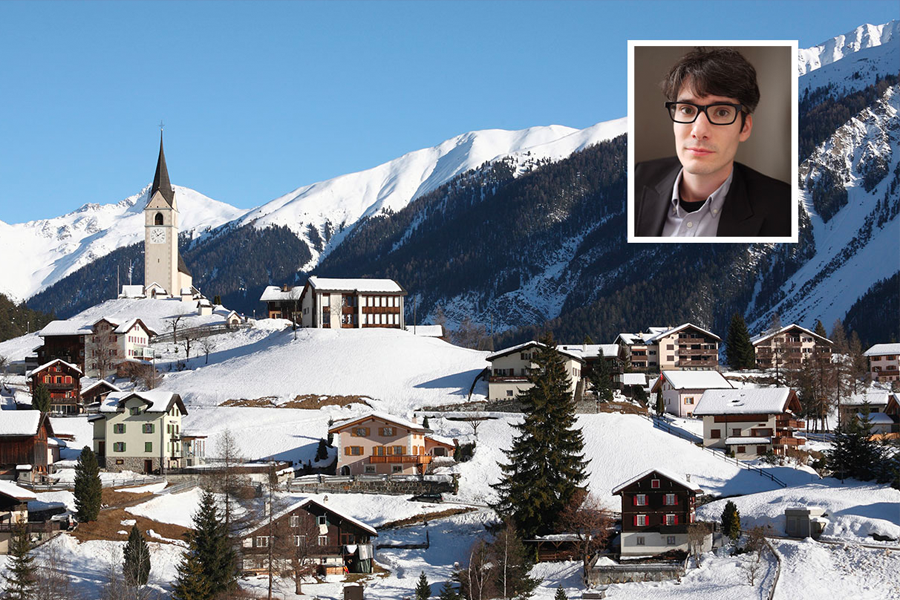
Rowe presents at the World Economic Forum
Eight Carnegie Mellon University faculty members, led President Subra Suresh, are presenting at the World Economic Forum's annual meeting in Davos, Switzerland, today through Jan. 23. One of the largest university delegations at the prestigious conference, the CMU faculty will meet with government and business leaders from around the world to explain the latest research in fields such as big data, artificial intelligence and climate change.
This year's theme is the "Fourth Industrial Revolution," a time of rapid, tsunami-like changes in work, education and science.
CMU's strengths in learning science via the Simon Initiative and human-computer
Carnegie Mellon is one of only 25 universities in the world, 12 in the U.S., that have been invited to join the Global University Leaders Forum. CMU has been a member since 2011. Business members of the Forum include the top 1,000 companies from around the world that drive the economy forward and collaborate on shaping global, regional and industry agendas.
Klaus Schwab, the forum’s founder and executive chairman, has said that the world is in the early stages of the "Fourth Industrial Revolution," which is the theme of this year's meeting. Schwab defined the period as a time of rapid changes in work, education and science.
"The speed of this revolution is so fast that it makes it difficult or even impossible for the political community to follow up with the necessary regulatory and legislative frameworks," Schwab said.
This year's program is designed to prepare decision-makers for a future of exponentially disruptive economic, industry and societal change. Among the sessions is the "CMU Ideas Lab: The Promise and Peril of Omnipresent Sensors," which took place Thursday, Jan. 21.
President Suresh introduced four CMU faculty members discussed the question "What are the possibilities and the dangers when practically everything can communicate with everything else?"
- Lorrie Cranor, Professor of Computer Science and of Engineering and Public Policy
- Chris Harrison, Assistant Professor of Human-Computer Interaction
- Amy Ogan, Assistant Professor of Human-Computer Interaction
- Anthony Rowe, Associate Professor of Engineering
The session was facilitated by Gareth Mitchell, a lecturer in Broadcast Communication at the Imperial College London, United Kingdom.
President Suresh will join Elizabeth Blackburn, president of the Salk Institute for Biological Studies, Suzanne Fortier, principal, McGill University, and Carlos Moedas, commissioner of the Research, Science and Innovation, European Commission, Brussels for "Global Science Outlook," which will discuss top issues including incentivizing science for societal impact, the role of business in science and public trust and reliability of research findings. Mariette DiChristina, editor-in-chief of Scientific American will moderate the discussion which will broadcast live at 7 a.m. (EST) on Saturday, Jan. 23.
School of Computer Science Dean Andrew Moore is part of four panels "Building an Intelligent Machine: The Nature IdeasLab;" "Preparing for the Future of Jobs;" "The State of Artificial Intelligence," which will broadcast live at 6 a.m. (EST) on Wednesday, Jan. 20; and "Life in 2030: Humankind and the Machine," which will broadcast live at 12:30 p.m. (EST) on Friday, Jan. 22.
Justine Cassell, professor and associate dean, Technology Strategy and Impact, School of Computer Science, will serve on six panels, "Women in Science;" "The Virtual Peer;" "Mastering the Future: Managing Disruption;" "Human Dignity in Global Supply Chains;" "Infusing Emotional Intelligence into AI," which will broadcast live at 9 a.m. (EST) on Friday, Jan. 22; and "Staying Human," which will broadcast live at 8:45 a.m. on Saturday, Jan. 23.
Randy Sargent, a senior systems scientist, and Illah Nourbakhsh, a professor at the Robotics Institute, will share a number of Earth Time-Lapses, such as "The War on Water," where visitors will embark on a visual exploration that reveals the Arctic, oceans and freshwater crises. The sessions feature high-resolution satellite images from NASA's Landsat Program, which provides the longest continuous global record of the Earth's surface. Additional sessions will reveal humanity's accelerating use of resources, unprecedented urbanization and industrialization.
Nourbakhsh will also discuss changing children's education as part of the "Creative Curricula" and "The Digital Path to Learning" sessions.
More information the CMU's involvement in the World Economic Forum.